Gambling, a form of entertainment enjoyed by millions around the globe, can be broadly defined as wagering something of value (typically money) on an event with an uncertain outcome. From the glitzy casinos of Las Vegas to virtual online platforms accessible anywhere, the allure of gambling stems from the thrilling blend of risk, reward, and chance.
In 2021, the global gambling market size was valued at approximately $465 billion, reflecting its immense popularity. Rapid technological advancements have fueled this growth, making gambling more accessible and diverse. While it’s an industry flourishing on uncertainty, one thing is sure: the magnetic pull of potential quick gains, the strategic maneuvering, and the luck factor make gambling an enduring pastime.
Gambling games typically involve a mix of luck and skill. While some of them are primarily chance-based, relying heavily on the randomness of outcomes, others necessitate a degree of skill or strategy to influence the result. Understanding the balance between luck and skill in a given game can significantly impact your experience and, potentially, your winnings.
Understanding Luck in Gambling Games
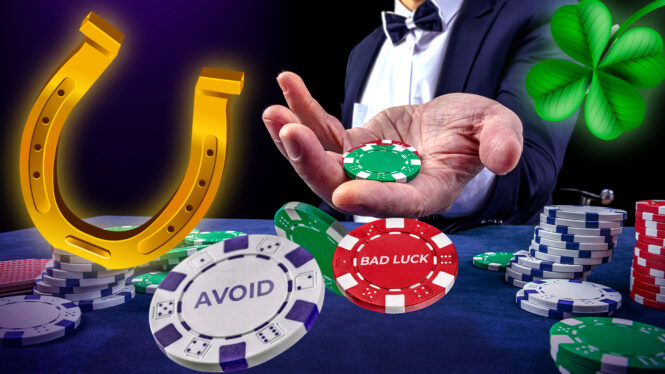
Luck, in gambling terms, is the positive outcome of an event that occurs beyond the gambler’s control. It’s the unpredictable element that can turn the tables in an instant. Winning the lottery, hitting a slot machine jackpot, or getting a royal flush in poker — all of these are classic examples of luck.
In certain gambling games, the outcome is predominantly determined by luck. This means that the result is random, and the gambler has little to no influence over it. The roll of dice, the spin of a roulette wheel, or the shuffle of a deck of cards – all are governed by chance. Luck-based games usually have fixed odds and offer equal winning opportunities to all players, regardless of their skill or experience level.
Slot machines, lottery games, and roulette are prime examples of luck-based ones. For instance, when playing slots, each spin is independent and random, with outcomes determined by a random number generator. The same applies to lottery draws, where every ticket has an equally random chance of winning.
Understanding Skill in Gambling Games
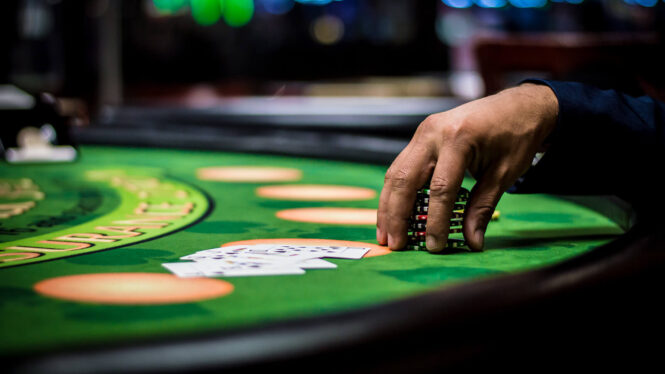
Skill in gambling is the application of knowledge, strategy, and calculated decision-making to influence the outcome of a game. Unlike luck, skill improves with practice and experience, allowing players to gain an edge over less experienced opponents or even the house, in some cases.
In skill-based games, while the element of luck still exists, players can significantly sway the odds in their favor by employing effective strategies, understanding the game mechanics, and making astute decisions. The outcomes in these games aren’t purely random; they’re also a reflection of a player’s skill level.
Poker and Blackjack are known for their emphasis on skill. In Poker, for example, players can use strategic betting, bluffing, and an understanding of odds to win, even if they aren’t dealt the best hand. In Blackjack, basic strategy can help to minimize the house edge, making it one of the more ‘winnable’ casino titles.
Games of Pure Chance: The Role of Luck
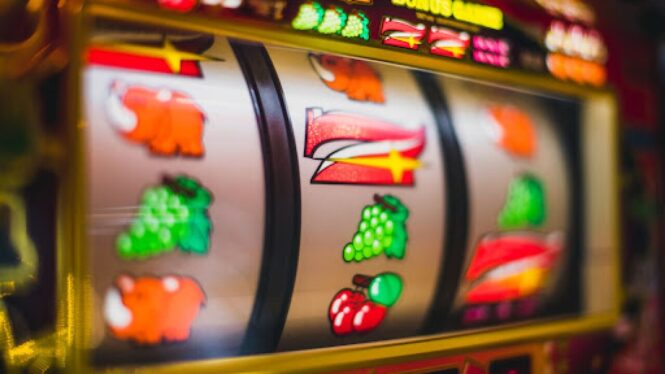
Pure chance games are those where the outcome is entirely dependent on luck, and player decisions or strategies have no impact on the result. These kinds are simple to play, as they don’t require any learning or skill application.
Slot machines and roulette are classic examples of pure chance games. In slot online machines, the combination of symbols on each spin is entirely random, decided by a random number generator. Roulette also relies on chance as the outcome of the spin of the wheel and the rolling of the ball can’t be predicted or influenced.
The random number generators used in these games ensure absolute randomness, making luck the deciding factor. Moreover, house edges are designed into these games, making long-term profits unlikely. This is why players are advised to see pure chance primarily as entertainment, rather than a consistent money-making opportunity.
Games of Skill: The Role of Skill
Skill-based games are those where player decisions significantly impact the game’s outcome. They require an understanding of the game’s rules, strategy, and sometimes, the ability to read opponents. Skill-based ones offer a level of control to players, making them appealing to those who enjoy using strategy and critical thinking.
Poker and Blackjack are two popular examples of skill-based gambling games. In Poker, a player must understand betting strategies, probability, and even the art of bluffing. Blackjack, while also involving elements of chance, allows skilled players to reduce the house edge significantly by using a basic strategy.
Chess, though not typically categorized as a gambling game, is a perfect example of a game entirely based on skill, with no element of luck involved.
The critical factor contributing to the importance of skill in these games is the ability of players to influence outcomes. A well-planned strategy can significantly shift the odds in the player’s favor. Thus, while a newbie may struggle initially, a seasoned player with a well-honed strategy has a better chance of success.
Games with Elements of Both Luck and Skill
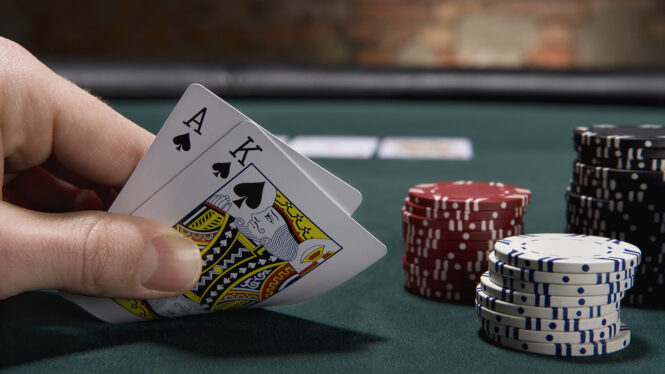
Games with mixed elements are those where both luck and skill play a part in determining the outcome. The balance between luck and skill varies within these ones, with some requiring more skill than luck and vice versa.
Craps, Baccarat, and Sports Betting are games where luck and skill intertwine. For instance, in Craps, while the roll of the dice is random, players can use strategies to manage their bets. In Baccarat, although the cards dealt are purely chance-based, players can choose their bets wisely to optimize their chances of winning.
Sports Betting involves a significant amount of skill in predicting the outcome, but unexpected events during the game can bring in the luck factor.
Analyzing the balance of luck and skill in these games can help a player make informed decisions on betting strategies. Understanding the game mechanics, practicing, and gathering knowledge about the game can help reduce the role of luck and increase the influence of skill in the long run.
The Impact of Luck and Skill on Winning Streaks
Luck can often lead to short-term winning streaks in gambling. This can happen in any game, but it’s particularly noticeable in games of pure chance. A player might hit a string of lucky spins on a slot machine or get dealt several good hands in a row in a card game. However, it’s important to understand that these streaks are random and not indicative of any pattern.
Unlike luck, skill can contribute to more consistent performance and potentially even long-term profit in certain games. A good Poker player, for instance, can consistently win over time, despite having bad hands now and then. This is because they’re not just relying on getting good cards, but also on their understanding of the game, their strategy, and their ability to read other players.
Variance in gambling refers to the statistical measure of how far actual results can deviate from the expected results. Even skill-based ones can see short-term results swing widely due to variance. Understanding this concept is crucial in recognizing the reality of winning and losing streaks.
The Gambler’s Fallacy is the mistaken belief that if something happens more frequently than normal during a certain period, it’s less likely to happen in the future, or vice versa. It’s essential to remember in gambling, each event is independent; previous outcomes do not influence future ones.
Strategies for Luck-Based Games
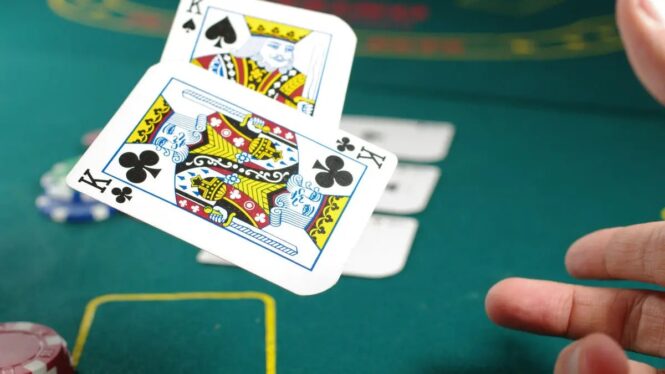
The first strategy for luck-based games is to accept the inherent randomness and adjust your expectations accordingly. You should understand that winning is not a guarantee and losing streaks are part of the game.
Bankroll management is crucial when playing luck-based games. Set a budget for your gambling activities and stick to it, ensuring you only gamble with money you can afford to lose. This strategy will help you enjoy them without the stress of potential financial problems.
Lastly, it’s important to focus on the entertainment aspect of gambling. Enjoy the experience rather than solely focusing on winning. And remember, responsible gambling means understanding the odds, acknowledging the risks, and knowing when to stop.
Strategies for Skill-Based Games
Understanding the rules is the first step towards mastering any skill-based game. One must know how the game works, what leads to wins, and the significance of each decision within the game. For instance, knowing when to hit or stand in Blackjack can significantly affect the game’s outcome.
Practice and experience are crucial in skill-based gambling. The more you play, the better you understand the game’s nuances and develop strategies. Whether it’s learning to bluff in Poker or understanding betting strategies in sports betting, time and experience are your best teachers.
A good gambler understands that every decision in a game affects the odds of winning. Understanding and analyzing probabilities can help make informed decisions, thus increasing the chances of winning in skill-based games. Additionally, applying a well-thought-out strategy can drastically increase your success rate over time.
Balancing Luck and Skill in Gambling Choices
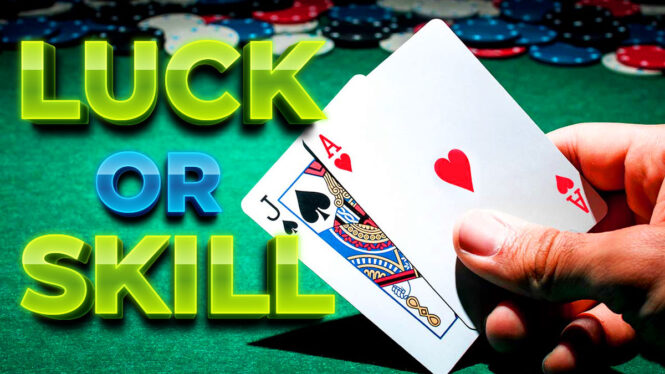
Choosing between luck-based or skill-based games often comes down to personal preference and comfort. If you enjoy the thrill of chance, luck-based games might be for you. If you prefer having control over the outcome, you might find skill-based games more enjoyable.
Consider factors like the time and effort you’re willing to invest in learning a game, your risk tolerance, and your goals – whether you’re playing merely for fun or seeking a challenge.
Who says you have to choose one? Mixing games can lead to a more varied and enjoyable gambling experience. Play some rounds of slots and then switch over to the Blackjack table. This way, you can enjoy the thrill of luck and the challenge of skill in one session.
The Role of Psychology in Gambling
Psychology plays a significant role in gambling. The Gambler’s Fallacy, the belief that past events can influence future outcomes, can lead players to make irrational decisions. The Illusion of Control, where players believe they can somehow influence the outcomes of purely luck-based games, can also be detrimental.
Emotions can significantly impact decision-making in gambling. Winning can lead to euphoria and a desire to continue playing, while losses can create a desire to chase losses. It’s crucial to manage emotions and make decisions based on logic and strategy, not feelings.
A healthy mindset, including understanding that losing is part of the game and that games should be played for enjoyment, is crucial for a positive gambling experience. Staying disciplined, sticking to your budget, and knowing when to stop are all essential elements of responsible gambling.
 Imagup General Magazine 2024
Imagup General Magazine 2024



